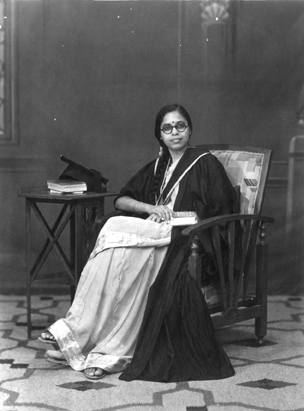
Dr Avula Sarada after receiving her doctorate.
|
Avula Sarada was born in Madras on an auspicious day, 12.12.1912. It was reflected in a very successful life.
While studying in what was then the only school exclusively for girls, the Presidency School for Girls in Egmore, she got double promotions twice. Her mother, whose ideas were considered modern for the times, thereupon decided that her daughter should pursue higher studies, while her two elder daughters were not allowed to go beyond their school finals.
Sarada's father, Avula Goviindrajulu Naidu, a well-known contractor at the time, built the two cooling towers near Basin Bridge which became one of the landmarks of Madras. He must have been very fond of his third daughter, otherwise there seems to be no reason for him to allow her to go to college in the early 1930s. After her intermediate in Queen Mary's College, she went on to Presidency where she was awarded a Gold Medal with her B.A. Hons. degree in 1932. While in college, she was a popular tennis player and studied music with the great veena master Sambasiva Rao.
She joined the Economics Department of the University of Madras in 1935 to do her Ph.D. under the guidance of Prof. P.J. Thomas. She was the first woman from the Economics Department to be awarded a Ph.D. by the University. After her thesis, Economic Conditions in the Madras Presidency – 1800-1850, was accepted, it was published by the University in 1941 and, today, it is considered the standard reference book on the economy of early 19th Century Madras. The book was reprinted in 1988.
Meanwhile, she undertook a project studying the cotton mills of the Presidency during which she visited the Salem Rajendra Mills. There she met the founder and chairman of the Mills, O.V. Raju, a confirmed bachelor. But the meeting changed their lives. He proposed to her and then got married with the consent of her parents. Though Raju was not highly qualified, Sarada and her parents were impressed with his intelligence, fluency in several languages, shrewdness and his various technical skills. He was very popular among mill owners due to his extraordinary skill in the installation of large machinery, which was a very complicated process in those days. He was also very popular among the mill workers because of his concern for their well-being.
After their marriage, they settled in Madras where Raju started various business ventures. They were blessed with three children, two daughters and a son, and Dr. Sarada Raju became a full-time housewife, exchanging a bright career for time spent with her children. It was only after her children grew up, and her first daughter's marriage, that she thought of her career again.
She joined Wyoming University in the U.S. as a lecturer in Economics but stayed there only for a year, 1966-1967; she missed her family and returned to Madras. She then joined Fathima College in Madurai and served as Professor and Head of the Department of Economics from 1968 to '70, but her bonds with her family brought her back to Madras. She then celebrated her younger daughter's wedding. Dr. N.D. Sundaravadivelu, the then Vice-Chancellor of the University of Madras, who was her classmate at Presidency, invited her then to serve in the Economics Department as a Fellow and Visiting Professor, where she got involved in the P.L. 480 Wheat Loan Project. She was with the University from 1970 to '76.
While at the University she guided students for their M.Litt. Prominent among her students were M. Thambidurai, a former AIADMK Union Minister and now an M.P., who did his M.Litt in Industry, and Dr. Shanthi Naganathan, who did her M.Litt, in Economic Thought. She also guided fellowship students in the Tamil Nadu Archives. She also served as visiting professor at the Mother Teresa Women's University and gave guest lectures and keynote addresses at various educational institutions and conferences. She was also an external examiner for M.A., M.Phil, and Ph.D degrees in various institutions.
Her Presidential Address at Indian History Congress held in Calicut in 1978 was highly acclaimed by eminent economists and historians for the content as well as for her flair for the English language. This lecture has been in the centenary commemorative reprint of her book which was released a few weeks ago.
In 1976 she joined the Dr. B. Natarajan Institute of Techno Economic Studies and served as honorary director for projects till 1984. She was involved in all the research projects carried out by the institute, two of them being 'Tamil Nadu 2000 AD' and 'Tamil Nadu 2020 AD' commissioned by the Ford Foundation. It was a 1970s' forecast of events to come and is remarkable for its accuracy.
She was an outstanding scholar but an even better wife and mother. The family was her greater interest after 1984 till her last days.
|